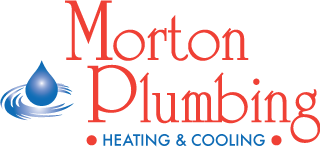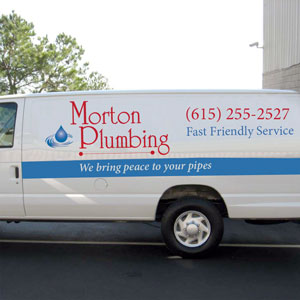Helpful Plumbing Tips
Our plumbers are always trying to find new ways to help our customers. We want you to be informed and know how to best assess a plumbing situation as it arises. When in doubt, call Morton Plumbing, Heating & Cooling, Inc. Here are some tips our customers have found helpful throughout the years. Some of our customers are handy and prefer DIY tips and advice. We are glad to help point you in the right direction. If you find you get stuck or need any assistance, we are here to come to the rescue. On this page you will find information regarding how to diagnose and repair leaks, frozen pipes, clogged drains and more.
Leaking Faucets
A leaking faucet with even a slow drip can waste 15 to 20 gallons of water per day.
If you enjoy plumbing projects and would like to do it yourself (DIY), here are some tips:
The first step in fixing a leaking or dripping faucet is identifying which of the two basic types of faucets you have: Compression faucets have an older design with two handles. Washer-free faucets have a more contemporary design, usually with a single lever or knob that controls the flow and mix of hot and cold water. These faucets may be one of several types: disc, valve, ball, or cartridge. Because models vary with the manufacturer, it’s important to obtain identical replacement parts.
When you’re disassembling the faucet, lubricate stubborn connections with penetrating oil before trying to loosen them with a wrench. Tape the wrench’s jaws to prevent marring visible parts of the fixture. Before starting any faucet repair, plug the sink so small parts can’t fall down the drain. Line the sink with a towel to prevent damage from tools or parts accidentally dropped.
As you disassemble the faucet, line up the pieces in the order that you removed them so you can assemble them properly.
Caution: Before you work on a faucet, turn off the water at the fixture shutoff valves or the main shutoff valve and open the faucet to drain the pipes. If you are not sure where your shut-off valves are, our plumbers will gladly mark them for you.
Leaky Pipes
Has your water bill recently risen? Do you hear running water, when all faucets have been turned off? You may have a leaky pipe causing water loss.
What to do when you suspect a leaking pipe:
- Inspect the fixtures to ensure all the faucets are tightly shut.
- Examine your water meter (if applicable) to ensure the dial is not moving when your water has been shut off.
Tips to locate a leak at its source:
- The sound of running water should be tracked. Follow the sound to its source. A listening device is quite helpful when looking for leaks. You may purchase one at your local hardware store in the plumbing supplies section. If water is staining the ceiling or dripping down, the leak is probably directly above.
- Wall stains indicate a leak that is likely housed above the stain.
- If you don’t hear running water or have visible wall stains, inspect your crawl space or basement for leaks.
If you experience a significant leak, turn off the water immediately, either at the fixture shutoff valve or the main shutoff valve. If you are not sure where your shut-off valves are, Morton Plumbing will gladly mark them for you.
Leaking Water Heaters
One of the most common leaks reported by homeowners is a leak caused by a hot water heater. Leaks can occur from a crack cause by pressure or rust over time or a pipe burst. According to National Water Service, a homeowner’s insurance policy will likely cover the expenses involved water damage resulting from a water heater leak, as long as the leak was not ongoing and proper maintenance was performed. Morton Plumbing encourages customers to also check their water heater warranty in the event of an early failure.
Repairing the Leak
Once you have located the leak, you should replace the leaking section of pipe. If you don’t have plumbing supplies and tools on hand, visit your local supply store. Morton Plumbing is always glad to assist you with noisy, leaky or frozen pipes.
Leak Marks on Walls or Ceiling
Our plumbers often receive calls after a long period of rain in Nashville. Customers call about wet marks they have found in their ceiling or along a wall. Many times they are not sure whether to call a restoration company or a plumber. It is best to start with calling a plumber to come out and assess the situation and track down the leak. Stopping the leak early can save a major expense in the long run. Sometimes damage from a leak may be covered by your homeowner’s policy. In general, most homeowners’ policies cover the cost of sudden, accidental damages to the structure & contents of a single home. Contact your insurance agent for specifics relative to your policy. Ceiling leaks most often are the result of a bathroom leak. Let Morton Plumbing, Heating & Cooling take care of any leak repairs you may have. All our work is guaranteed.
Frozen Pipes
A faucet that won’t allow water to flow is certainly a warning sign of frozen pipes. If severe weather arrives, you may prevent freezing and resulting bursting of pipes by following the suggestions below. When temperatures fall extremely low, here’s how to keep your pipes from freezing:
- What we all have heard about dripping the faucets is true. Be sure to keep a running drip or small stream of water running from interior faucets.
- Insulate your pipes. You may use insulating materials such as tape or foam.
- Keep bedroom and all interior doors open.
- Heat your exposed sections of pipe with a small heat source.
Pipe “Hammer Sounds”
“Water hammer” is a noise that resonates with a hammering sound in your pipes. This noise occurs when you abruptly turn off a water source. The water flowing through the pipes halts, causing a “hammer type” noise.
If you are hearing hammering sounds when turning off faucets or appliances:
- Shut off the water valves in your house
- Inspect your pipes and determine whether any are loose
- Inspect for faulty air chambers
If you are not sure where your shut-off valves are, Morton Plumbing will gladly mark them for you.
Leaking Shower Heads
Does your shower leak right at the arm piece of the shower head? You may want to try replacing the washer first. Simply loosen the collar, using rib-jointed pliers. Unscrew the head from the adjusting ring. Uneven or weak water pressure generally indicates mineral deposits have formed. To restore proper flow to your shower, clean outlet holes with a pin or dismount the shower’s face plate and soak it overnight in vinegar, scrub, and refit.
Clogged Drains
A clogged sink drain is certainly an inconvenience; it may actually be an emergency. It’s wise to prevent clogs before they happen. Be alert to the warning signs of a sluggish drain. It’s easier to open a drain that’s slowing down than one that’s stopped completely.
Run or pour scalding water down the drain to break up grease build-up. If hot water doesn’t unclog the drain, an object may be blocking it. To check for object blockage, remove and thoroughly clean the sink pop-up stopper or strainer. Determine if the clog is close to the sink by checking the other drains in your home. If more than one drain won’t clear, an object is likely blocking the main drain.
The most effective way to clear a clog is with a snake. You may purchase a snake at a hardware store that carries plumbing supplies or a plumbing supply store. You can try using a plunger or a chemical drain.
Warning: Don’t mix chemicals. Mixing an acid and an alkali cleaner can cause an explosion. Don’t look down the drain after pouring a chemical. The solution often boils up and gives off toxic fumes.
Morton Plumbing is always glad to assist you with any drain clogs. Send a Nashville service request to Morton Plumbing.
Clogged Showers
Though it may be difficult to unclog a shower drain with a plunger, it’s worth a try. If that doesn’t work, using a snake may help. Maneuver the snake down into the drain opening to clear the clogged drain.
Caution: Never leave a hose or snake in a drain: a sudden drop in water pressure could draw sewage back into the fresh water supply.
Sink Sprayer Issues
A kitchen sink sprayer is frequently used in most homes. The sprayer can get clogged or develop diverter valve issues.
Here are some helpful tips for trouble-shooting sink sprayer problems:
- If the flow of your sprayer is sluggish, check for a kinked hose line.
- Be sure to clean the aerator in the spray nozzle regularly.
- Continued low pressure in the spray may indicate diverter valve problems.
- If the sprayer head leaks, remove it from the hose and replace the internal washer.
- For a leak at the faucet end of the hose, tighten the hose coupling.
- If the hose itself leaks, it’s best to replace it.
Our plumbing company serves Nashville TN and surrounding areas.
Morton Plumbing, Heating & Cooling2426 Winford Ave.
Nashville, TN 37211
Did you know?
Our plumbers can help you with the following problems:
Google Review
Morton Plumbing is quick, responsive, and everyone I’ve spoken with was as nice as can be. As a new-ish homeowner, they walked me through everything and I found them so nice to work with and they did a great job.
Serving Nashville, TN
Morton Plumbing, Heating & Cooling, Inc. services Nashville, TN and surrounding areas.

